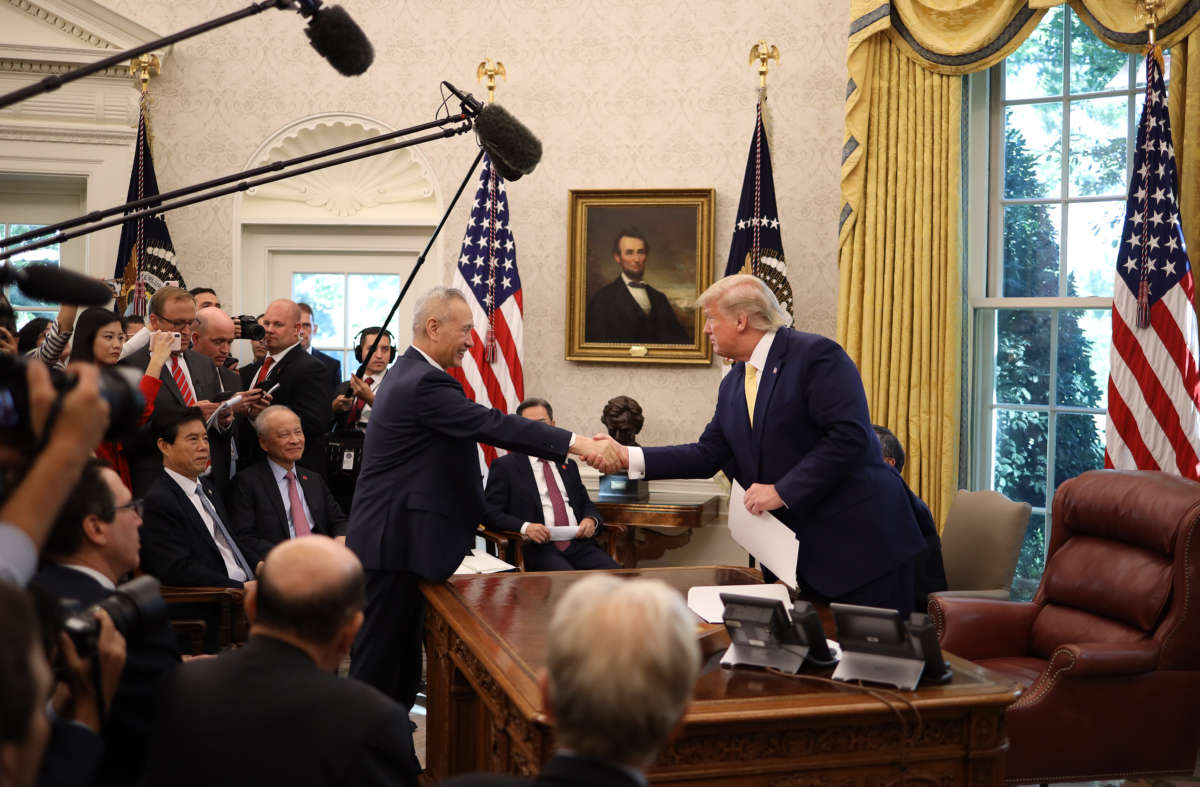Truthout is a vital news source and a living history of political struggle. If you think our work is valuable, support us with a donation of any size.
As he faced impeachment, Donald Trump touted his trade deals as evidence of the great success of his presidency. Specifically, he touted his revised North American Free Trade Agreement (NAFTA), which the Democratic leadership agreed to, and a first-round trade agreement with China. In both cases, people are more likely to hear Trump’s boasts than to see any economic benefit from these deals.
In the case of the new NAFTA (called the United States-Mexico-Canada Agreement), it is essentially the old NAFTA, with some minor twists, both positive and negative. On the positive side, congressional Democrats forced Trump to include some serious language on labor rights in Mexico. While it remains to be seen how enforceable these will be, they are definitely stronger than the provisions in the original NAFTA.
It also helps that Mexico’s current president, Andres Manuel Lopez Obrador, is its most labor-friendly leader in more than half-century. In most cases, Obrador will likely be happy to improve labor standards in Mexico in accordance with the agreement.
While provisions that can improve the living standards of Mexican workers should be seen as good, this is unlikely to make much difference in terms of the number of manufacturing jobs going from the U.S. to Mexico. Even if the labor provisions of the deal are fully enforced, wages will still be far lower in Mexico than in the United States.
The one positive aspect of this picture for U.S. workers is that most of the jobs that are likely to be transferred to Mexico have already moved there. Some jobs are undoubtedly still threatened with being moved going forward, but for the most part, the big transfer of manufacturing jobs has already taken place.
A big plus, for which congressional Democrats deserve considerable credit, was the removal of provisions that would have lengthened patent protections for prescription drugs. This provision would not only raise drug prices in our trading partners, it would lock in high prices in the United States. Democrats insisted that the patent-lengthening provisions be removed as a condition of reaching an agreement.
The major downside of the revised NAFTA was that it left in place wording that will make it more difficult to regulate the internet. There is a whole range of internet concerns on issues such as privacy, ownership of data, and the spreading of false information that has been raised in the United States and elsewhere.
The revised NAFTA will make it more difficult to impose new regulations in any of these areas. Of special concern is that the deal locks in, and applies to our trading partners, Section 230 of the Communications Decency Act. This protects internet intermediaries, like Facebook, from facing the same sort of liability for knowingly spreading false information that print and broadcast outlets face.
This means, for example, that if someone falsely alleges that a person committed a horrible crime, Facebook has no responsibility to remove the allegation, even if it can be shown to be false. Since the intention of the administration and Congress is to treat the revised NAFTA as a model for other trade deals, this special treatment of internet intermediaries is a very bad story.
It is harder to pass judgment on the “phase one” China deal, since we don’t really know what is there. The Trump administration and the Chinese government are making different claims about what was agreed to.
One thing that we can be reasonably sure of is that the deal will not fundamentally alter the U.S. trading relationship with China. The U.S. is likely to continue to be a large net importer of manufactured goods from China.
China is also not about to restructure its entire economy in accordance with Donald Trump’s vision. This fact was obvious to arithmetic fans everywhere. Our imports from China come to less than 4.0 percent of China’s GDP. Much of the value added of these imports comes from other countries. For example, most of the value of an iPhone imported from China comes from the U.S. The value added of the items we import from China is almost certainly less than 3.0 percent of its GDP.
Even if Trump’s tariffs reduced this by half (they have not come close), that is still only a hit of 1.5 percent of GDP. That would slow China’s growth, but not be the sort of thing that would get it to restructure its economy. In fact, it likely would not even cause a recession. In short, Trump was fighting a trade war without any ammunition.
So, enjoy the celebration of Donald Trump’s big trade deals, but don’t expect to see any benefits for the economy. You won’t find them.
A terrifying moment. We appeal for your support.
In the last weeks, we have witnessed an authoritarian assault on communities in Minnesota and across the nation.
The need for truthful, grassroots reporting is urgent at this cataclysmic historical moment. Yet, Trump-aligned billionaires and other allies have taken over many legacy media outlets — the culmination of a decades-long campaign to place control of the narrative into the hands of the political right.
We refuse to let Trump’s blatant propaganda machine go unchecked. Untethered to corporate ownership or advertisers, Truthout remains fearless in our reporting and our determination to use journalism as a tool for justice.
But we need your help just to fund our basic expenses. Over 80 percent of Truthout’s funding comes from small individual donations from our community of readers, and over a third of our total budget is supported by recurring monthly donors.
Truthout’s fundraiser ended last night, and we fell just short of our goal. But your support still matters immensely. Whether you can make a small monthly donation or a larger one-time gift, Truthout only works with your help.
